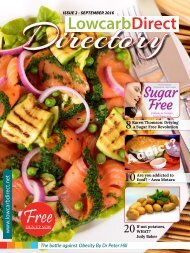LowCarbDirect.net Issue 03
LowCarbDirect.net Issue 03
LowCarbDirect.net Issue 03
You also want an ePaper? Increase the reach of your titles
YUMPU automatically turns print PDFs into web optimized ePapers that Google loves.
10 | LowcarbDirect Directory - <strong>Issue</strong> 3 - October 2016<br />
By Dr Peter Hill<br />
from UpforIt<br />
(www.upforit.co.za)<br />
Insulin<br />
Resistance:<br />
where it all begins to go wrong<br />
If you are one of those unfortunate people who happens<br />
to have a spare tire for a tummy or if your rearend<br />
resembles a large bagel – or both – then there is a<br />
good chance that it’s NOT YOUR FAULT! That’s right - being<br />
overweight or obese is most often not the result of a lack of<br />
willpower and because you eat too much and don’t exercise<br />
enough. It is primarily the result of the metabolic dysfunction<br />
called ‘insulin resistance’.<br />
Are you always hungry and often too tired to<br />
exercise?<br />
Now, you may eat too much (of the wrong foods, especially<br />
carbs) and don’t exercise enough, but that’s because you are<br />
forced to do so by your underlying insulin resistance. Don’t<br />
beat yourself up. You are always hungry and often too tired<br />
to exercise because of physiological reasons and not because<br />
of psychology. And guess what? If you are an overweight or<br />
obese woman then you find yourself in the majority. Almost<br />
70% of all adult females in South Africa are overweight or<br />
obese.<br />
The hormone insulin is secreted by your pancreas in<br />
response to blood sugar (glucose), which is mainly derived<br />
from carbohydrate in your diet. If you are insulin resistant,<br />
which is defined as “ the diminished ability of a given<br />
concentration of insulin to exert is normal biological<br />
effect”, then you may have higher than normal insulin<br />
levels over extended periods of time and, as a result, your<br />
cells will have lost some of their sensitivity to insulin.<br />
Foods high in starch and sugar drive insulin<br />
levels<br />
Starch and sugar are refined carbohydrates and they drive<br />
insulin levels. Bread, pasta, biscuits, cakes, breakfast cereals,<br />
sweets and chocolate, sugar sweetened beverages,<br />
Insulin<br />
Driving<br />
Foods






